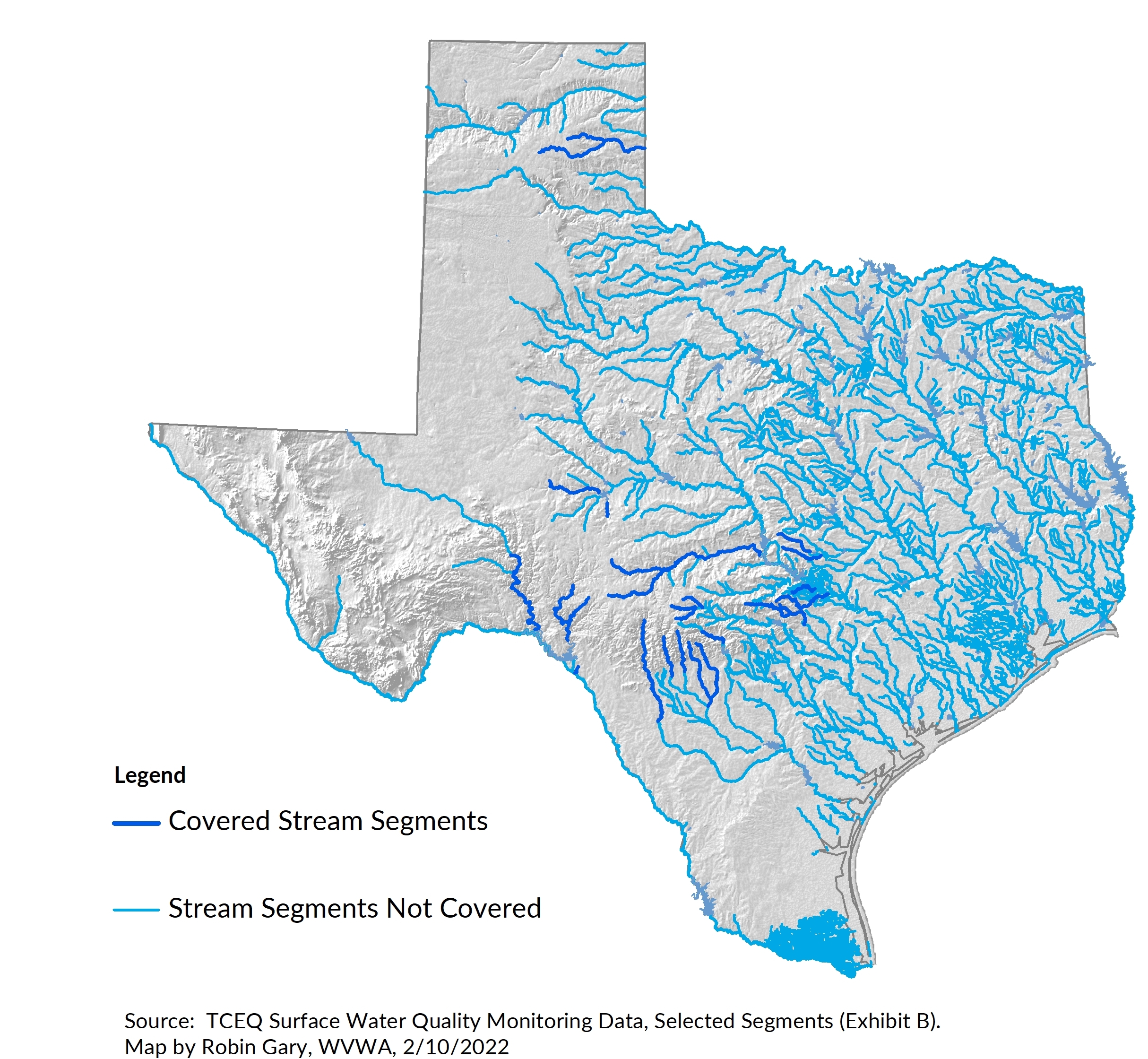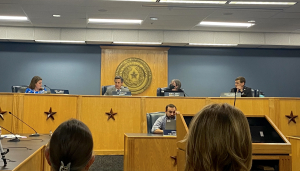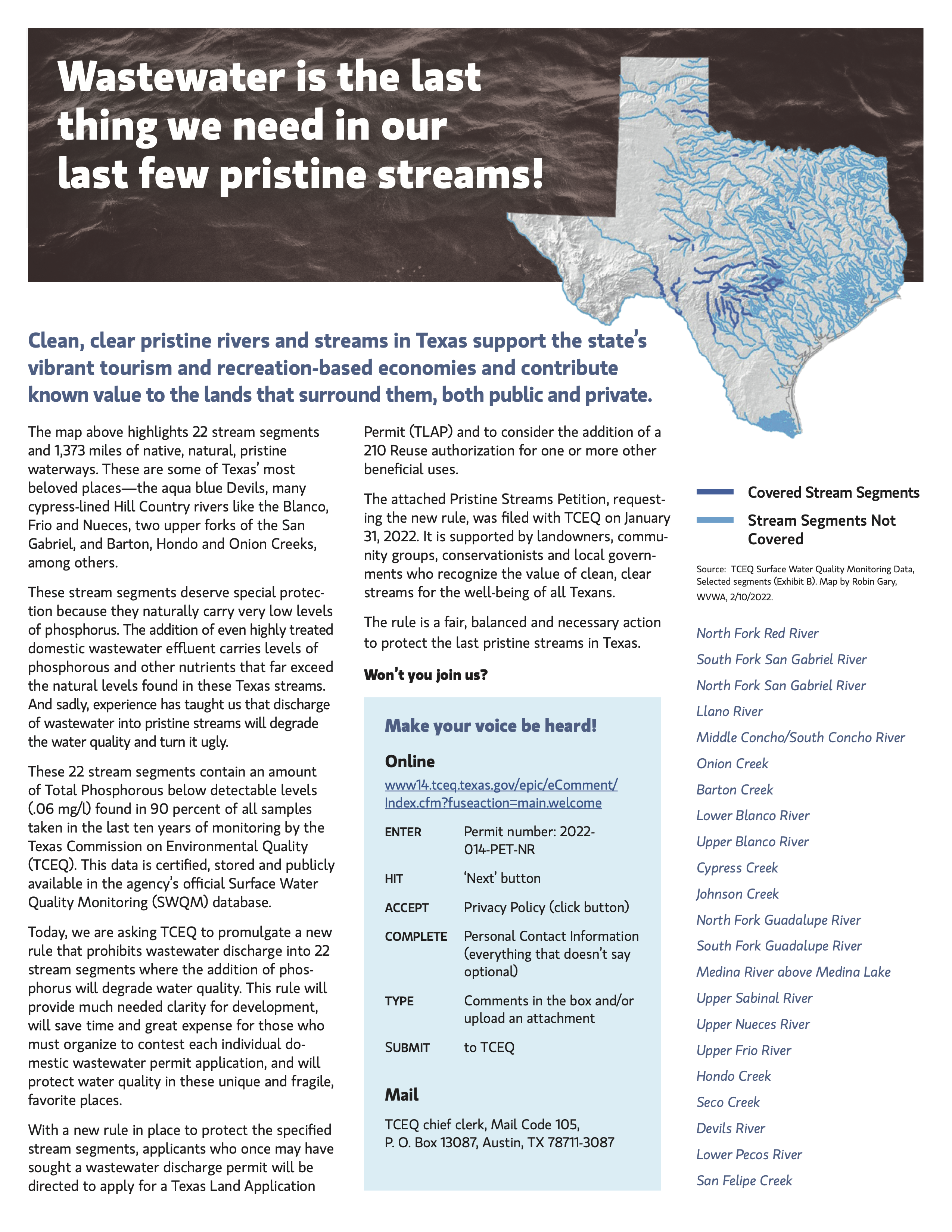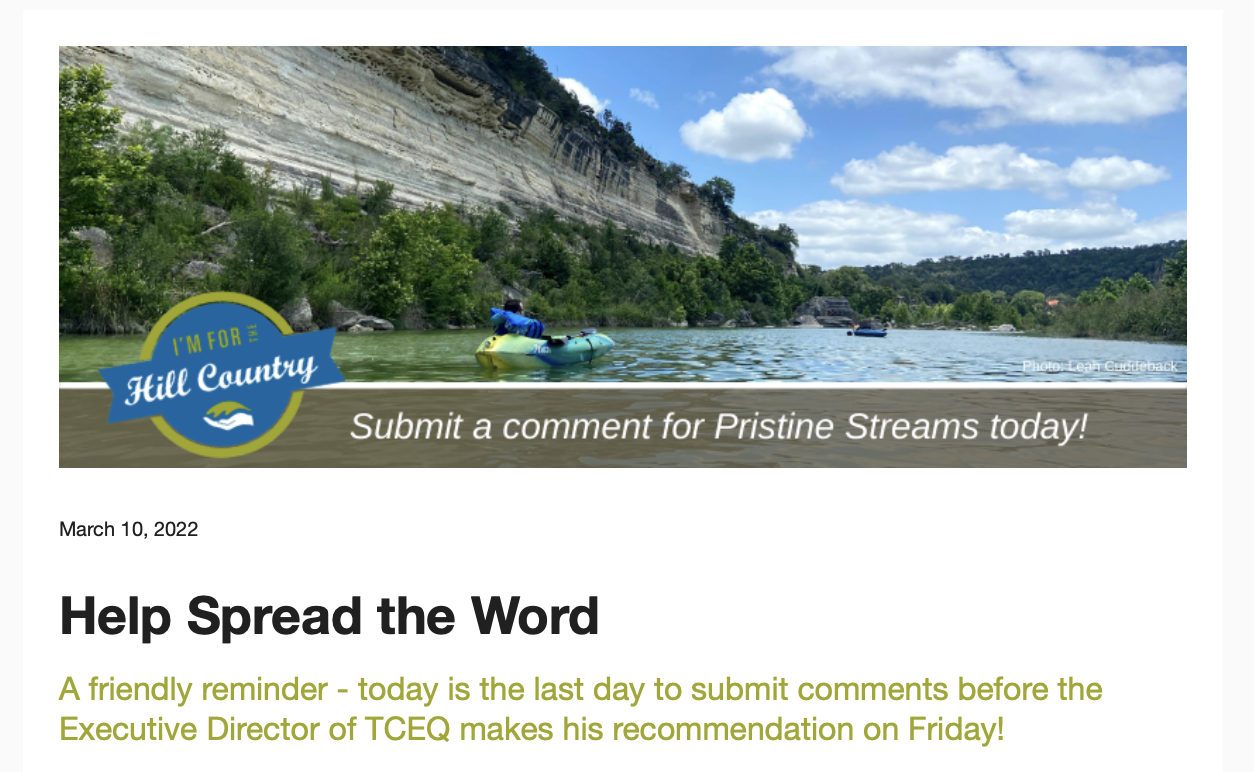Pristine Streams

Clean, clear pristine rivers and streams in Texas support the state’s vibrant tourism and recreation-based economies and contribute known value to the lands that surround them, both public and private. Wastewater is the last thing we need in our remaining pristine streams.
Currently, advocates are working on a strategy to change the rules at the Texas Commission on Environmental Quality (TCEQ), the entity in charge of overseeing environmental regulations. With a new rule in place to protect the specified stream segments, applicants who once may have sought a wastewater discharge permit will be directed to apply for a Texas Land Application Permit (TLAP) and to consider the addition of a Chapter 210 Reuse Authorization for one or more other beneficial uses.
The rule would protect several of the Hill Country’s most iconic streams, including portions of the Blanco, Llano, and Nueces Rivers, as well as smaller streams like Barton, Cypress, and Hondo Creeks. Supported by landowners, community groups, conservationists and local governments, this proposal is a fair, balanced and necessary action to protect the last pristine streams in Texas.
But what IS a pristine stream?
Pristine streams are technically defined as a stream segment with naturally occurring phosphorous levels below 10 micrograms, or 0.01 milligrams, per liter in 90% of all water quality tests over the past 10 years. Texas has over 1,800 classified stream segments; however, only 22 classified stream segments met this criteria – that’s less than 1% of all streams in Texas!

If proposed new rules are accepted, the stream segments shown in dark blue would be protected from further degradation due to wastewater discharge. Map by Robin Gary, Wimberley Valley Watershed Association.
Explore affected stream segments
The map at left highlights 22 stream segments and 1,373 miles of natural, pristine waterways. These are some of Texas’ most beloved places and are in need of protection. The below stream segments would be covered under the new rule change petition. These stream segments deserve special protection because they naturally carry very low levels of phosphorus. The addition of even highly treated domestic wastewater effluent carries levels of phosphorous and other nutrients that far exceed the natural levels found in these Texas streams.
- North Fork Red River
- South Fork San Gabriel River
- North Fork San Gabriel River
- Llano River
- Middle Concho/South Concho River Onion Creek
- Barton Creek
- Lower Blanco River
- Upper Blanco River
- Cypress Creek
- Johnson Creek
- North Fork Guadalupe River
- South Fork Guadalupe River Medina River above Medina Lake Upper Sabinal River
- Upper Nueces River
- Upper Frio River
- Hondo Creek
- Seco Creek
- Devils River
- Lower Pecos River
- San Felipe Creek
Timeline of recent advocacy for Texas’ Pristine Streams
2023 Updates:
On February 8th, the TCEQ Commissioners unanimously approved a rule change to allow a applicant to apply for a 210 reuse permit at the same time as either a direct discharge (TPDES) or land application (TLAP) wastewater permit. In the words of HCA partner Margo Denke, “this change saves the applicant time in the permitting process, and brings the issue of beneficial reuse to consideration for all applicants right from the start.”
At that same meeting, the TCEQ Commissioners considered a recommendation from the Administrative Law Judge (ALJ) to reduce Liberty Hill’s discharge permit from a limit of 150 mcg of phosporus/L to 50 mcg of phosphorus/L. That reduction, while significant, would not be protective of the San Gabriel River. The ALJ based that limit on what they felt would be feasible, rather than what would be protective. As a result, the TCEQ commissioners voted to send the case back to the ALJ to produce a new recommendation for a phosphorus limit based on a level that would actually protect the river.
closed
2022 - Petitioning TCEQ

Photo of TCEQ Commissioners at dais during the public hearing on the Pristine Streams Petition on March 30, 2022. – Credit: Sydney Beckner
January : A broad coalition of landowners and advocacy organizations filed a petition to the Texas Commission on Environmental Quality (TCEQ) to accept a new rule that prohibits wastewater discharge into 22 stream segments where the addition of phosphorus will degrade water quality. A public hearing was scheduled for March.
March : At the public hearing on the Pristine Streams Petition, the TCEQ Commissioners heard testimony from a number of concerned citizens across the state on how protecting these few remaining streams is important. However, the Commissioner’s ultimately denied the Petition in a 2-1 vote, but as Chairman Jon Niermann acknowledged during the meeting, “The waters at issue here are state treasures,” and opened his door to a public meeting just on this topic. HCA and our partners have taken the Chairman up on his offer and look forward to the meeting scheduled in August of this year.
August : A public meeting has been scheduled to discuss a path forward to protect the less than 1% of pristine stream segments in the state.
October: Potential TCEQ rules change could smooth the path for water reuse in Texas. On September 22, the Commission voted to approve publication of a rulemaking that would “amend Section 210.5 related to the requirements to obtain an authorization for the use of reclaimed water. This change would clarify under Section 210.5(a) that an application to obtain an authorization under Chapter 210 may be submitted concurrently or any time after submittal of an application for a permit to treat and dispose of wastewater.”
We have a long way to go to conserving, protecting, and even enhancing our water resources all across the Hill Country—especially when it comes to the discharge of treated wastewater into pristine streams. But the good news is that the collective voices of so many Hill Country residents and landowners calling for the conservation of water resources are being heard in Austin!
2021 - Legislative Efforts
During the 86th Texas Legislative session, HB 4146, known as the “Pristine Streams Bill,” unanimously passed the House Committee on Environmental Regulation with bipartisan support. Unfortunately, the bill championed by Rep. Tracy King and supported broadly by environmental and landowner organizations, died in Calendars without being heard in the Senate. While this effort failed to become law, this bill made it further than any previous bill on wastewater discharge ever had, a success worth celebrating.
Learn More
Sky Lewey River Protection Fund
Sky Marshal Jones-Lewey (May 26, 1958 – May 31, 2022) dedicated her life, work, and passion to protecting Texas’s rivers and in doing so, touched the hearts and minds of thousands of Texas landowners, paddlers, and river advocates. Several important campaigns that Sky championed remain unrealized. One of the most urgent is to protect Texas’ few remaining pristine streams. In partnership with Sky’s incredible family, including her children Jeff and Julie Lewey, the Hill Country Alliance established the Sky Lewey River Protection Fund. This fund will be used to ensure that Sky’s legacy continues and the work to protect her Nueces River – and all the rivers of our state – carries on.
“Everything we do on the land is eventually reflected in a river. That’s why it’s so important to think about the whole landscape, how big and little pieces fit together.”
– Sky Lewey
What to do when a new wastewater source comes knocking…
Wastewater is one of the biggest challenges facing the Hill Country’s pristine streams. New and growing entities producing and treating wastewater– from new housing developments to youth camps– need wastewater disposal permits from TCEQ in order to discharge treated wastewater into rivers, apply it to land for irrigation, or reuse it for other purposes. TCEQ has a public participation process for new and amended permit applications, but that process can be confusing and difficult to navigate.
If you want to learn what to do when a new wastewater discharge permit is coming to your part of the Hill Country, check out the video and links below:
Past Advocacy on Pristine Streams
closed
One-pager on Pristine Streams

Wastewater is the last thing we need in our pristine streams!
Clean, clear pristine rivers and streams in Texas support the state’s vibrant tourism and recreation-based economies and contribute known value to the lands that surround them, both public and private.
2022 Pristine Streams Petition to TCEQ
Submit a comment for Pristine Streams today!
The TCEQ Commissioners meet Wednesday, March 30 to make a decision on the Pristine Stream Petition. Make sure they hear from you! Filed January 31, this petition requests the TCEQ to accept a new rule that prohibits wastewater discharge into 22 stream segments where the addition of phosphorus will degrade water quality.
Resolutions of Support
On March 8, 2022 the City of Blanco approved a resolution in support of the Pristine Streams Petition.
On March 8, 2022 Edwards County approved a resolution in support of the Pristine Streams Petition.
On March 14, 2022 Real County approved a resolution in support of the Pristine Streams Petition.
On March 15, 2022 the City of Bandera approved a resolution in support of the Pristine Streams Petition.
Recent Water Quality News
Protect the Pedernales: The dangers of discharge
The Pedernales River is one of Texas’s most cherished waterways, an ecological, recreational and cultural treasure that defines the Hill Country. As stewards of this vital resource, the Pedernales River Alliance (PRA) has opposed the wastewater permit application...
An EPA rule will reduce lead in drinking water—Unless this effort to block it succeeds
A landmark Environmental Protection Agency rule enacted at the end of last year sought to address the lead crisis—which threatens the health of millions of Americans—by tightening limitations on toxic lead and copper in drinking water. But that might not be the final...
Texas lawmaker files bill to reduce “forever chemicals” in sewage-based fertilizer
Johnson County’s newest state representative, Helen Kerwin, R-Cleburne, filed her first bill Friday targeting an environmental problem that has struck her county: PFAS contamination in sewage sludge-based fertilizers. Kerwin said House Bill 1674, could reduce the...
Texas regulators report more than 250 new cases of groundwater contamination
Texas agencies reported 252 new cases of groundwater contamination during 2023 in the Texas Groundwater Protection Committee annual report. The latest report compiles 2,870 open cases of groundwater contamination, some of which date back decades. Nearly every county...

